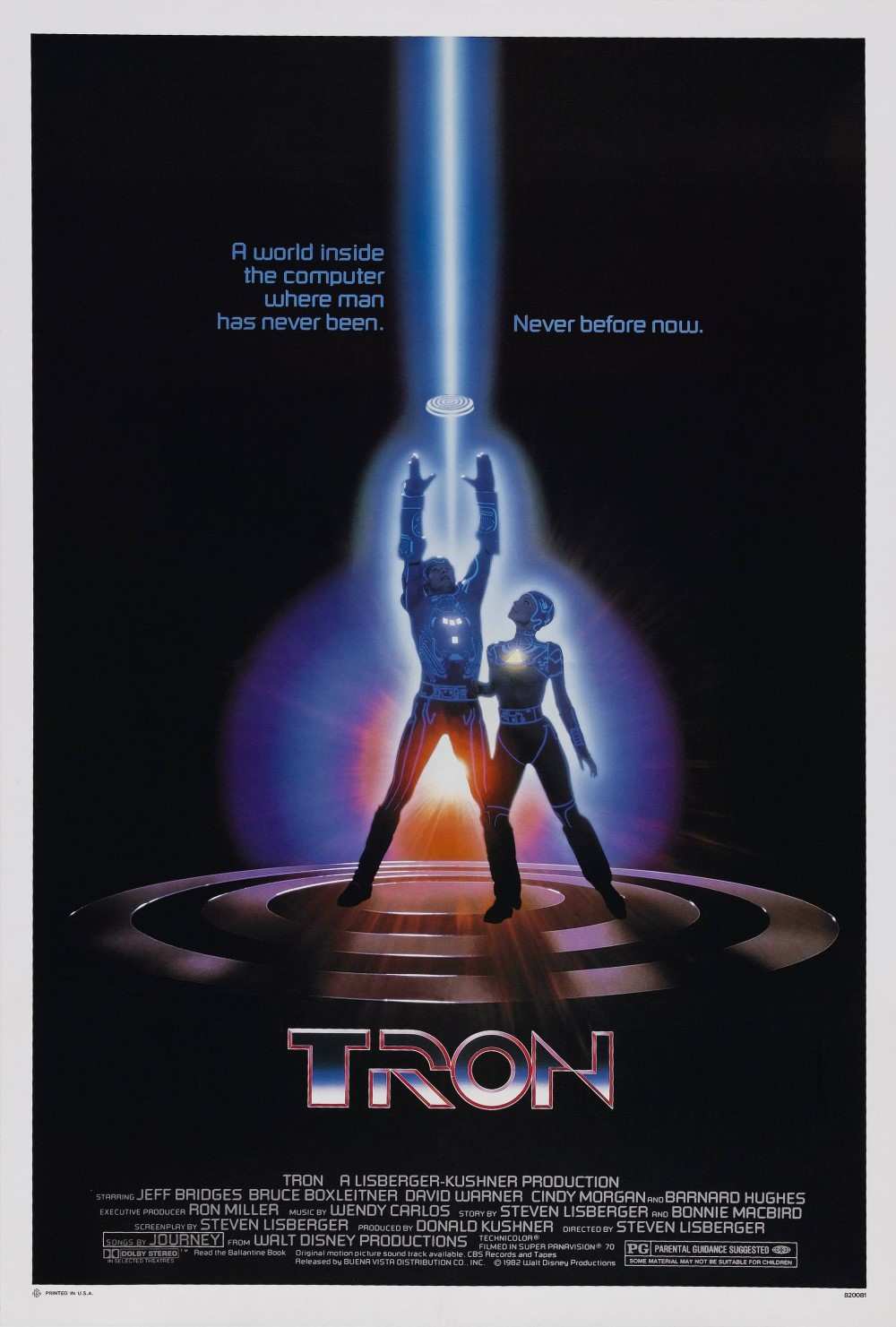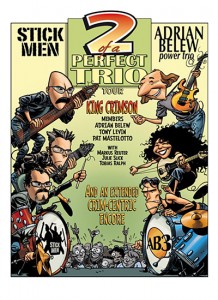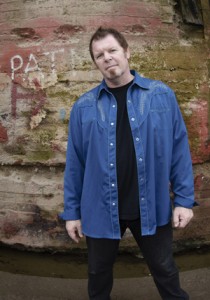“Tony Levin is one of the world’s best bass players, if not the best.” – Peter Gabriel
So true.
Tony Levin (aka “TLev”) is the bass player’s bass player. Incredibly accurate in his musical phrasing but always matching the song’s mood with a sense of fluidity and true funkiness, Tony’s playing is always recognizable and unmistakable. At the forefront of experimentation, the array of instruments at his disposal isn’t strictly limited to his signature Music Man bass (which he often plays with “funk fingers” – an invention of his own design that allows him to hammer on the strings with half-size drumsticks that he attaches with tape to the index and middle fingers of his right hand), but includes the polyphonic Chapman Stick as well the Electric Upright Bass (EUB) and a host of other instrumentation.
Levin is primarily known for his work with King Crimson and Peter Gabriel as well as numerous spin-off projects like Stick Men (featuring two Chapman Stick players and current Crimson drummer, Pat Mastelotto), the Liquid Tension Experiment (with members of Dream Theatre), in addition to a host of King Crimson-related “ProjeKcts”. Over the course of his extensive career, he’s been involved with over 500 records as a session musician. The list includes some of the best-known artists in the business: John Lennon, Lou Reed, Alice Cooper, Todd Rundgren, Pink Floyd, Yes and Warren Zevon – just to name a few. And then there’s the list of musicians he’s toured with: Paul Simon, Peter Frampton, James Taylor, Richie Sambora…
He’s just finished being a part of the “Three of a Perfect Pair” Camp, a week-long music camp in New York state that allowed its campers – musicians and non-musicians alike – to learn from, jam out and hang with three members of the Crimson court: Adrian Belew, Pat Mastelotto and, of course, the esteemed Mr. Levin. In mid-September, the three Crims embark on the “Two of a Perfect Trio” tour which pairs Belew’s Power Trio with Levin’s Stick Men trio. The show closes with “an extended Crim-centric encore.”
I caught up with Tony between the last day of Camp and the start of the tour to chat about both of these topics as well as some of his wide array of side projects and session work. We also talked about how he goes about writing music and choosing from the myriad of instruments he’s mastered. I managed to squeeze in a couple of questions that only the seasoned Crim / TLev fan (a la “DPic”) would ever really care about – and even posed a question from one of his former touring buddies, Rick Wakeman of Yes. Tony’s answer was truly mind-boggling…
Dave Picton: How’d it go with the “Three of a Perfect Pair” Music Camp?
Tony Levin: Very well. I knew it’d be fun, but it turned out that the vibrant ‘campers’ and their passion for King Crimson’s music made it a growing experience for me. And I got the feeling they were really pleased to spend the week in that setting, hanging out with us Crimson guys. We also were able to get a lot of surprise gifts for them, which didn’t hurt!
DPic: What was the genesis of the “Two of a Perfect Trio” tour?
TLev: Seemed a good name for the tour – it’s based on the song title “Three of a Perfect Pair”. Since we have two trios… The idea for touring together, and with a Crimson based encore set, came from Adrian. He’d been thinking for some time of doing something like this with Pat and me.
DPic: “A Scarcity of Miracles” is the latest King Crimson ProjeKct. What has been your favorite ProjeKct to date (and it doesn’t necessarily have to be one that you were a member of)? Opinions / observations about being in the projeKcts (so to speak)?
TLev: The thing about me is that, like many musicians, I don’t look backward much. So I don’t even know the list of ProjeKcts I’ve done, let alone have a favorite. I can say that all of my playing in Crimson-related groups has been a great experience for me – expanding my own playing, and learning from some very special musicians. I also hope there will be lots more of it in the future.
DPic: The list of artists with whom you’ve done session work is staggering. Is there a favorite musician that you’ve worked with? Any favorite behind-the-scenes story?
TLev: Again, no favorites. Looking back, I’d have to say that my experiences with Peter Gabriel and with King Crimson (each encompassing many albums) were great for me. I also toured a lot with each, and that makes it a more complete experience – really I prefer playing live to recording, but doing both is the best way to immerse yourself in the music.
DPic: When you’re creating a song or contributing as a session musician, how do you choose between using electric bass or Chapman Stick or Electric Upright Bass?
TLev: A good question. There is no rule for me, but when I hear the song (or the composition, if it’s an instrumental) I get a sense of what I think I can contribute on the bass end. It may be simple or complex, but I sort of hear it in my head – then I can choose the instrument that might express it best. Even among my basses there are subtle differences that make some much better for certain things I might want to do. The Chapman Stick is very different, with it’s sharp attacks and huge range. I also sometimes opt for the NS Electric Upright with it’s almost acoustic bass- sound, and huge bottom end. If I’m writing the piece, sometimes I just write the music, and then approach it later as the bassist – choosing then. Sometimes of course I base the song on a riff or idea I have on a particular instrument. With Stick Men, needless to say, I write my material on the Chapman Stick.
DPic: As an aspiring bassist, I’m very intrigued by the Chapman Stick and would love to try one out before committing to buying one. Do you know of any way I (or any other Stick-curious folks) can try/rent one out?
TLev: Best idea is to contact Stick Enterprises (stick.com) and ask them – they might be able to hook you up with a player in your area, so you can try it out and have some guidance. There is a very nice community of Stick players around the world.
DPic: Your book, “Beyond the Bass Clef”, is one of the most enjoyable music-related books I’ve ever read. Any plans for a follow-up (i.e. “Way Way Waaaaay Beyond the Bass Clef”)?
TLev: Good idea – but no plans at the moment. Books and photo exhibits are great fun, but time consuming, and best done when no recording or band projects are taking up my time and creative energy. Lately, happy to say, I’m very busy making new music.
DPic: You were one of the first musicians to actively blog and keep an ongoing road diary on the web. In your opinion, how has the internet and the web affected music and musicians – both positive and negative AND you personally?
TLev: For me, it was quickly apparent that this was a great way to minimize the wall between performer and audience. It doesn’t take it away, but gives a way to share more of the experience than just the show. So I like showing behind the scenes, and telling what’s going on, and especially sharing my photos of the audience – so people who were there can see how inspiring they are to us on stage, and how they are really in some ways a part of the show.
DPic: A few years back, I spoke with world- renowned trumpet-player Chris Botti at a post-show meet-and-greet where he was kind enough to sign my copy of “Bruford Levin Upper Extremities: Blue Nights”. Many of his band-mates had never seen the CD, so he showed it to all of them and told me “I’d love to work with those guys again!” Soooo…would you be game? What about Bill Bruford and David Torn?
TLev: Always something we discuss when we meet up. Realistically, it’s been pretty unlikely for some time, and now more so, with Bill’s retirement from playing live. We did have great fun, and made some darn good music. You learn to never say never in music situations, so I’ll stick with ‘unlikely’ but add that it’d be really great if it did happen again.
DPic: One of my all-time favorite bands is Pink Floyd. On the “A Momentary Lapse of Reason” album, you played all of the bass parts. What was that experience like?
TLev: Very special. David Gilmour was great to work with, as was producer Bob Ezrin, whom I’d worked with a lot before that. Playing the music was fun, and once I got the hang of the style, it went smoothly. There was a chance of touring with the band too but, alas, it conflicted with a Peter Gabriel tour I was on.
DPic: OK…drum roll please…it’s time for the “Picayune Crimson Question That’s Plagued Me for Ages!”: On the initial LP release of “Three of a Perfect Pair”, the opening to the song “Sleepless” is a continuous non-stop bass riff extravaganza that’s – as far as I’m concerned – one of the funkiest I’ve ever heard. On all subsequent compilations and reissues, it’s markedly more staccato. Why is that? And will the original mix ever be reissued? I miss it!
TLev: I’m afraid I don’t know! I’ll try to find a copy and listen.
DPic: You were involved with the Yes-centric “Anderson, Bruford, Wakeman and Howe”. Earlier this week I interviewed Rick Wakeman. He wants to know when you’re going to get a proper haircut.
TLev: Indeed! I miss my nightly Boggle games with Rick. We’d play right up to beginning of show time … heck, even after it, since it began with a Steve Howe solo – then Rick would jump up to run onstage and play his solo section – having usually beat me, I must admit!
Related Content




